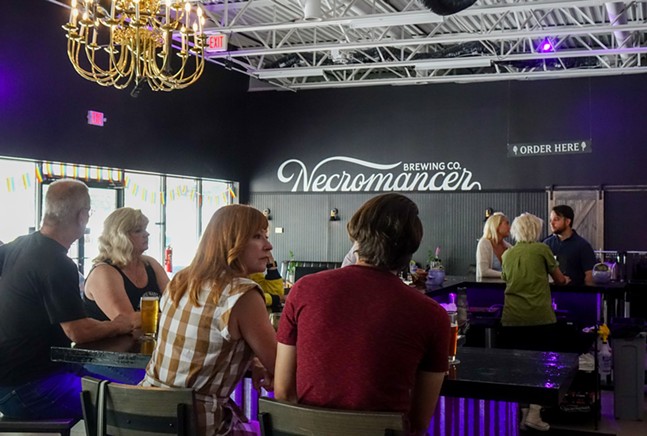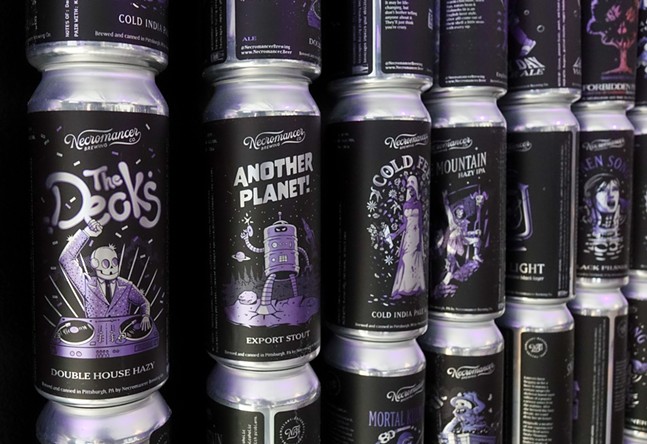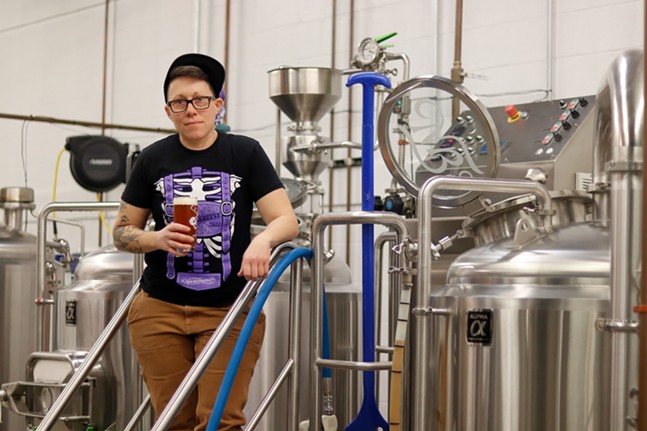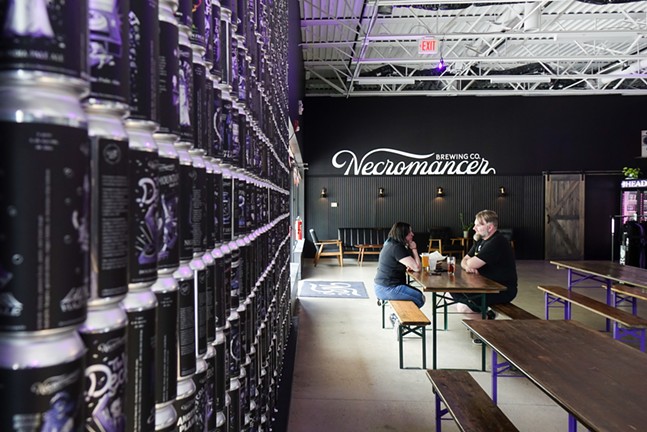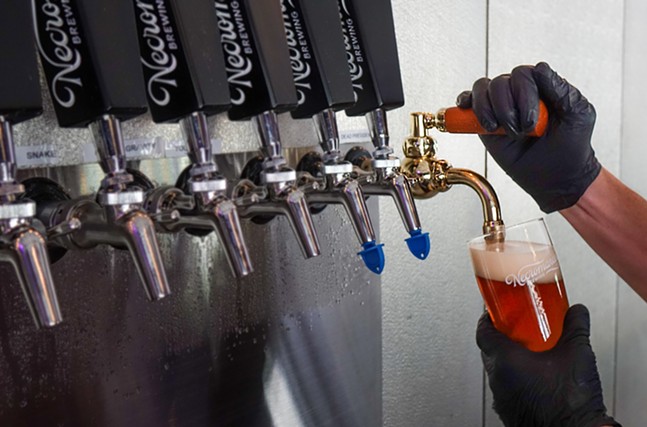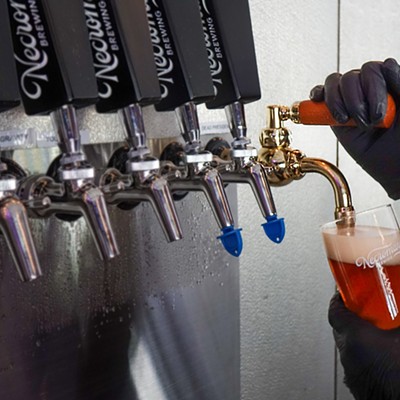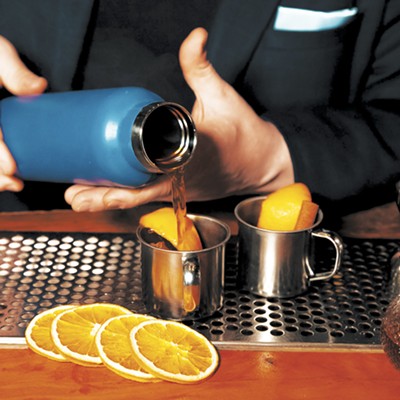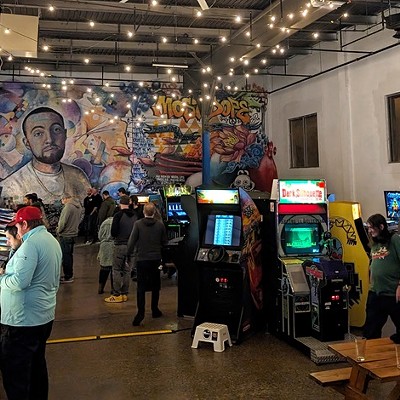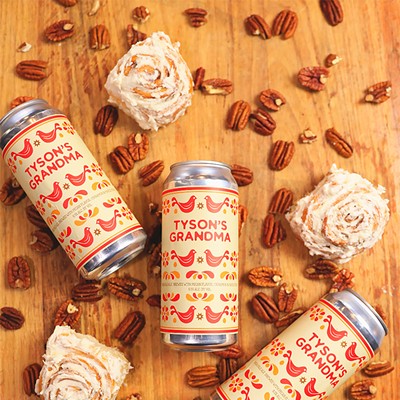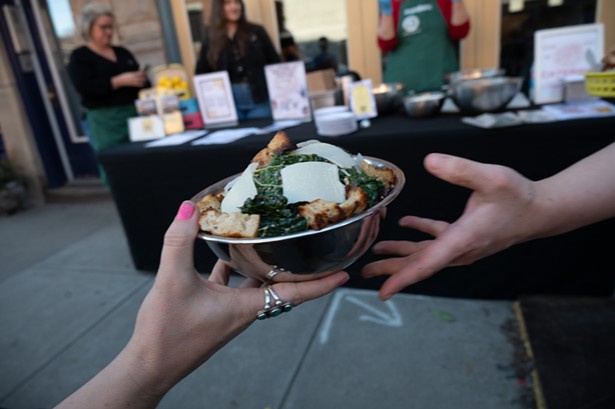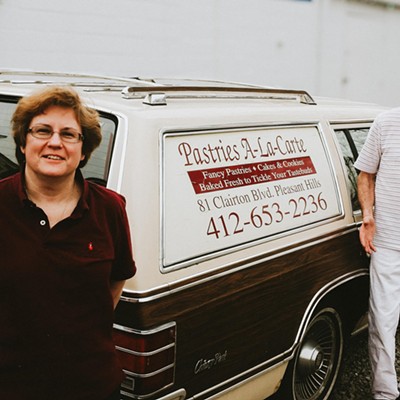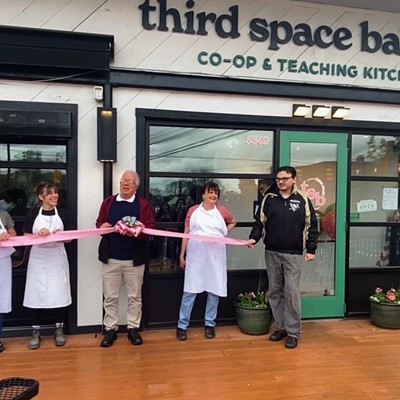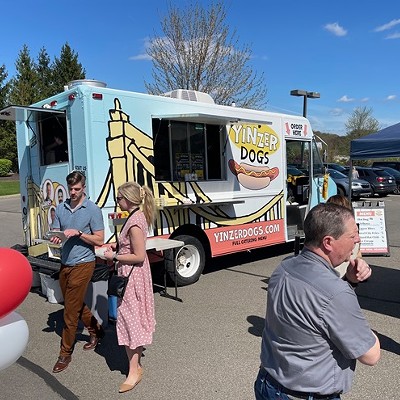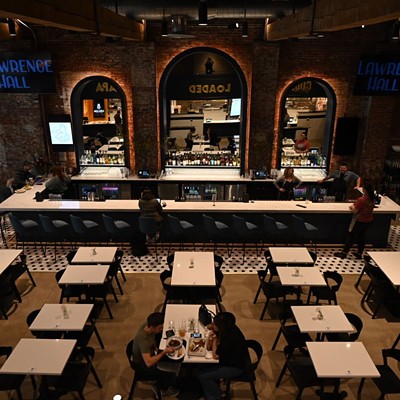Babcock Boulevard doesn’t necessarily strike the eye as somewhere worthy of a history lesson. Known mostly for its modern chains and as one of Pittsburgh’s many roads where the speed limit is just a state of mind, it could easily be remembered for nothing more. But dig beneath the surface a little and you’ll find a road that was renovated in the early 1900s to match the explosive population growth that sprang up from the Harmony Line, a trolley connecting Pittsburgh with remote industrial hubs like Butler and New Castle.
It’s this kind of detail, updating the rich texture of something long forgotten into something new and vibrant, that fuels everything Necromancer Brewing Co. does. The Ross Township brewery, only open for two years, has quickly become one of Pittsburgh’s most exciting and unique spots, simultaneously resurrecting beer styles that have been forgotten while ushering in people who have been cast aside in the craft beer industry.
Co-founder Ben Butler always had a vision, but never thought that his brewery would come to represent something larger than itself. The aims were simple: make really cool beer, with really good people.
“I was studying for my Ciccerone, and there was this whole category on historical beers,” he tells Pittsburgh City Paper during a conversation with head brewer Lauren Hughes. “I didn’t want to just open a brewery willy-nilly, I wanted to be driven by some sort of vision. And I thought it would be cool to focus on all of these dead beer styles.”
For Butler, it started as a passion in homebrewing, nurtured by working in web design for more and more breweries. In a parallel universe, Hughes was cutting her teeth in every corner of the Pittsburgh brewing scene.
“I homebrewed for probably 15, 20 years. I’ve worked everywhere … I worked at Sun King, I got a brewing job, then I eventually became the assistant head brewer at Penn Brewery,” she says.
It was two kindred spirits, driven by making something new out of something old. They just didn’t know it yet.
When Butler decided to finally pull the trigger and start his own brewery, he had some ideas.
Then an introduction from Andrew Witchey, founder of Dancing Gnome, brought Hughes into the picture. Call it fate, call it divine intervention from the craft beer gods, but the connection was strong and immediate.
“I was stoked,” Hughes tells City Paper. “I remember the first time Ben and I talked about it, it got me excited. It gets monotonous to brew the same 10 beers over and over again, so the research aspect really appealed to me. I don’t like putting stuff to bed, so I liked tweaking recipes and processes.”
She isn’t kidding. Necromancer has already brewed over 200 beers, an absurd number for a brewery of its size. The real unique ones come from their Resurrection Series, the beer styles they bring back from the dead. These have included a Rotbier, a red neer brewed exclusively with Barley; a Merseburger, a black hoppy ale that is from 18th century Saxonburg; and a Biere d’ete, a historic light, French summer ale.
The Necromancer concept formed quickly, the name coming from the poetic (resurrecting dead styles of beer) and the practical (it was available). Picking a location proved a more difficult task, though. After scouring sites all across the city, it seems fitting ,that they ended up at a spot on Babcock, with its history of reviving again and again.
“Just come drink the beer”
The story of Necromancer isn’t just one of dead beer styles and a brewery making waves. It’s a story of true commitment to its values, and proudly stating that craft beer is a space for everyone — a claim that has been hard to make through the industry’s history. And it wasn’t an ideal that was born out of opportunity, or a cynical idea of what could attract a different audience segment. Hughes is a member of the LGBTQ community, and she and Butler felt it should be a central tenet of Necromancer from the start.
“It’s our way of saying we don’t care who you are, just come drink the beer,” Hughes says. “There’s a lot of folks in that community who feel like they can’t go out anywhere without feeling weird or not accepted, and I think it’s another way of having them feel like we can just sit there and have a beer.”
It’s one thing to voice bold commitments on press releases or Instagram captions. It's entirely another to say it directly in the face of those who want to oppose it.
Last year, Necromancer ended up in a public controversy after an employee from Grist House made derogatory comments towards Nina Santiago, a Necromancer associate brewer who was wearing a “Queer AF” shirt at a beer festival.
“It’s like, you know who Necromancer is,” Butler says. “If you see a Necromancer employee wearing a queer-forward shirt, you should shut the fuck up and move on. You can be as clear and transparent about your values, and those people still feel uncomfortable.” And that was only the tip of the iceberg.
Last month, in response to the controversy over transgender influencer Dylan Mulvaney partnering with Bud Light and the ensuing outrage, Necromancer brewed a light lager called Even Gayer, with branding that looked suspiciously like an aforementioned national brand. The beer got picked up on social media by some of the right and the wrong people, and all of the sudden, Necromancer found itself at the center of the beer world. (As far as the beer goes, Hughes, Butler, and I drained a pitcher of it during our conversation and it was a fantastic example of a light lager).
Their initial Instagram post drew 157 comments, and a Facebook post after the announcement racked up 4,700. Many of the big beer influencers in the industry picked it up, generally to point and laugh at all the homophobes trying to find the next place to cancel despite claiming opposition to cancel culture.
For Butler and Hughes, it was amusing, but also real life, with all the exhaustion and mental taxation that comes with being the ones to deal with it.
“We were excited about it internally, but I don’t think any of us were prepared for the press, both good and bad,” Hughes says. “Ben especially, not being from the community, would message me daily like ‘Oh my God.’ But we were also really happy with the positive. That was one of the fastest beers we ever sold out of, from day one. It’s one of the beers I’m most proud of.”
Crucially, none of this shook Necromancer off their core values. If anything, it solidified them, strengthened by the majority of their crowd who feel safe and loved in their taproom and uninterested in the vocal minority who felt otherwise. Necromancer does a Queer Beer Club. They do frequent drag shows at the brewery. And most importantly, in their eyes, they have a code of conduct that has been clearly established at the brewery from the start.
Butler says any brewers can similarly create a welcoming environment regardless of their identity and affiliation.
“You can take the straightest, whitest brewery you can find, and how do you prevent incidents from happening, both internally and externally? You have a code of conduct, and you talk to those people about what your values are.”
Growing the vision
A respect for the community's history married with a passion for making it better and more welcoming has been a central theme at Necromancer, and it’s only continuing into the future. Necromancer recently announced that they have acquired the iconic Greenfield pub, Hough’s, and will turn that into a secondary location, something more akin to a neighborhood brewpub than a typical taproom space. To Butler and Hughes, it represents a next step, the ability to expand their product, their passion, and their sense of community to more people, and to keep the tradition of a Pittsburgh institution alive.
“We wanted another location that was another neighborhood, British-style pub, and I walked in and I was like ‘I want this. I need this,’” Butler says.
Hughes says her own experience with the location brings additional meaning,
“Hough’s used to be the craft beer mecca. When I first moved to Pittsburgh, I used to go there for tap takeovers. So when Ben was looking for a bar, it was a little bit personal.”
More than anything, Necromancer is tactile. The beer, the experience, the people behind it, it all feels lived in. It doesn’t judge, it doesn’t have preconceived notions of who you are, what you’re looking for, or why you’ve come to Necromancer to find it. It simply provides you with kind people, a warm environment, and some well-made beer that you’re probably not going to find in many other places. It's a community under the purple lights of the taproom, and the skeleton drawings that populate its walls.
Necromancer Brewing Co. 2257 Babcock Blvd. Ross Township. necromancer.beer

